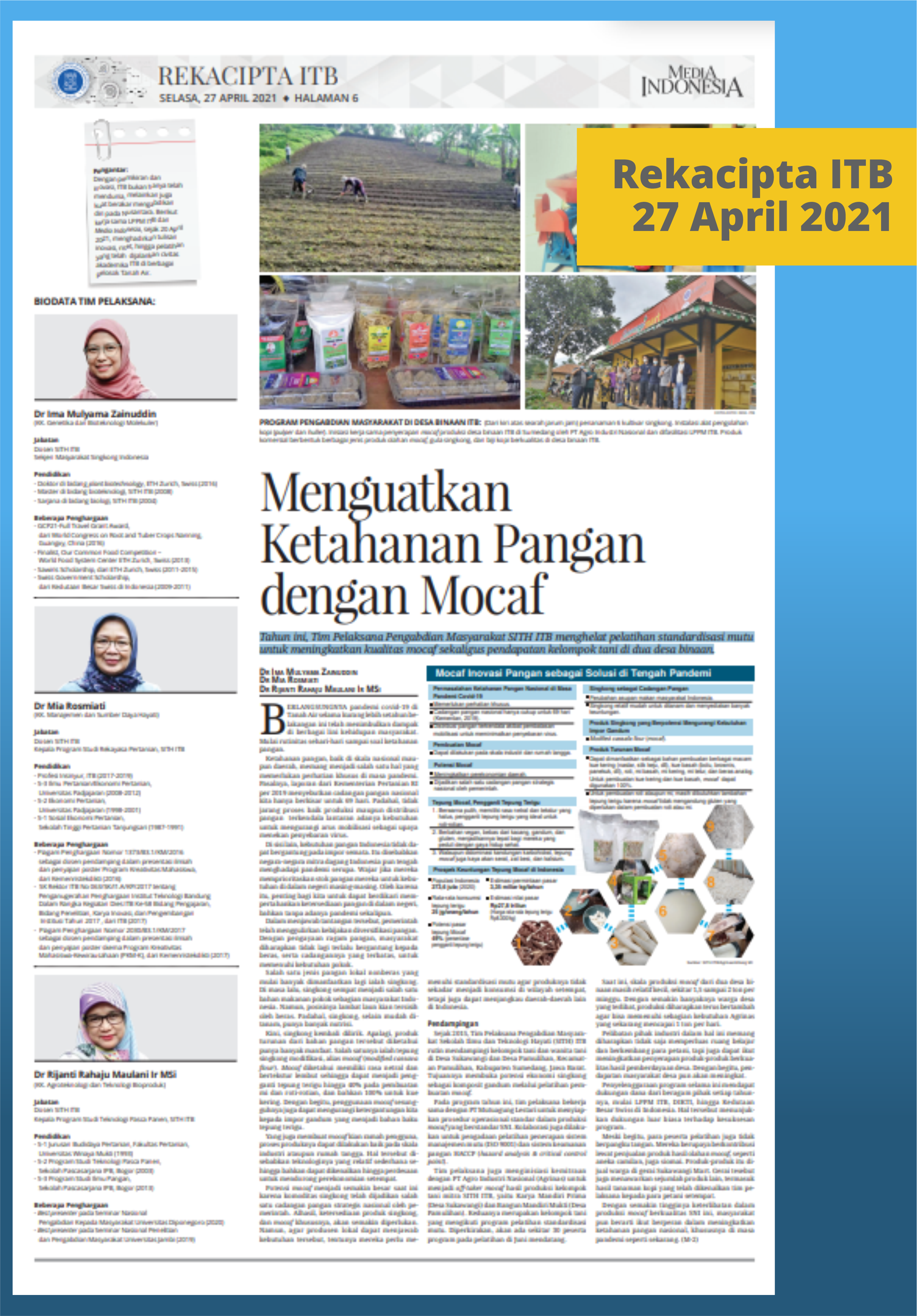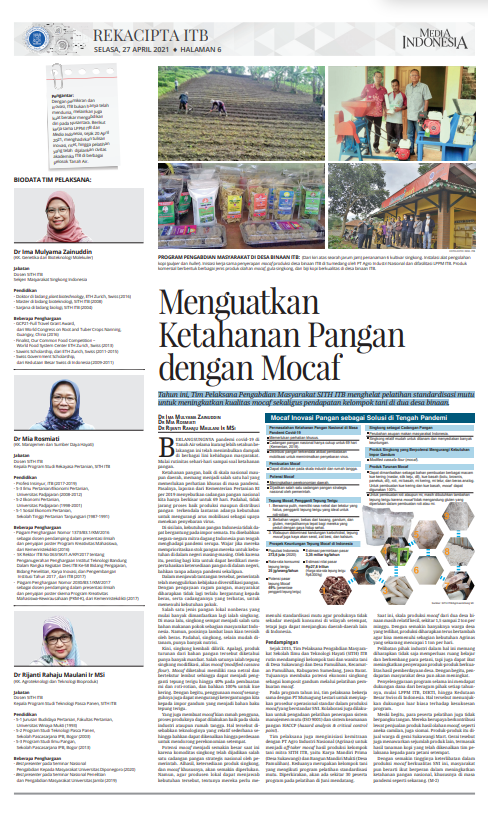

Strengthens Food security with Mocaf
This year, the Implementing Team of the Community Service Sith ITB held a quality standardization training to improve the quality of the mocaf and income of farmer groups in two assisted villages.
Pandemic Covid-19 in the country for more or less a year has had an impact on various lines of life. Start the daily routine until the matter of food security.
Food security, both on a national and regional scale, is indeed one of the things that requires special attention in the pandemic period. Because the report from the Indonesian Ministry of Agriculture per 2019 said our national food reserves only ranged from 69 days. In fact, it is not uncommon for the process of both the production and distribution of food is constrained by the need to reduce the flow of mobilization as an effort to suppress the spread of the virus.
On the other hand, Indonesia's food needs cannot depend on imports alone. It was caused by Indonesia's trading partner countries while facing similar pandemics. Naturally if they prioritize their food stocks for their respective needs. Therefore, it is important for us to be able to buy care of food availability in the country, even without pandemics though.
in responding to these challenges, the government has rolled out a diversified policy of food. With food enrichment, the community is expected to no longer depend on rice, and its limited reserves, to meet basic needs.
One of the types of nonberas local foods that began to be widely utilized was cassava. In the past, cassava had become one of the staple food ingredients of some Indonesian people. However, his position will gradually be troubled by rice. In fact, cassava, besides being easily planted, has a lot of nutrients.
Now, cassava is glanced again. Moreover, derivative products from food are known to have many benefits. One of them is modified cassava flour, aka Mocaf (Modifi Ed Cassava Flour). Mocaf is known to have a soft sense of neutral and textured so that it can be a replacement for flour of up to 40% on making MI and Rotian, and even 100% for pastries. That way, the use of mocaf actually can also reduce our dependence on wheat imports that are the raw material for wheat flour.
which also makes Mocaf is increasingly friendly, the product process can be done both on industrial or household scales. This is due to its relatively simple technology so it can even be introduced to rural areas to encourage the local economy.
Mocaf potential is getting bigger now because cassava commodities have been made one of the national strategic food reserves by the government. As a result, the availability of cassava products, and mocaf in particular, will be more necessary. However, so that local producers can answer these needs, of course they need to fulfill quality standardization so that the products are not just consumption in the local area, but can also reach other regions in Indonesia.
Mentoring
Since 2015, the Implementing Team of the Community Devotion of the Hayati Science and Technology (SITH) routinely accompanied farmer groups and farmers in Sukawangi Village and Pamulihan Village, Pamulihan Subdistrict, Sumedang Regency, West Java. The aim is to open the economic potential of cassava as a composite wheat through mocaf making training.
on this year's program, the implementing team cooperates with PT Mutuagung Lestari to prepare standard operational procedures in the production of SNI standard mocaf. Collaboration was also carried out for the procurement of training in the implementation of the Quality Management System (ISO 9001) and HACCP food security system (Hazard Analysis & Amp; Critical Control Point).
The Implementing Team also initiated partnerships with PT Agro Industri Industry (Agrinas) to become an Off-Taker of the Mocaf Production of Farmers Mitra Sith ITB, namely the Karya Mandiri Prima (Sukawangi Village) and Bangun Mandiri Mukti (Pamulihan Village). Both are farmer groups who take part in the quality standardization training program. It is estimated, there will be around 30 program participants in training in June.
At present, the scale of mocaf production from two built villages is still relatively small, around 1.5 to 2 tons per week. With the increasing number of villagers involved, production is expected to continue to grow in order to fulfill some agrinas needs that now reach 1 ton per day.
Engagement of the industry in this case is expected not only to expand the learning room and develop the farmers, but can also participate in increasing the absorption of quality products from village empowerment. That way, the income of the village community will increase.
The organization of the program has received funding from various parties every year, starting LPPM ITB, DIKTI, to the Swiss Embassy in Indonesia. This shows extraordinary support for the success of the program.
Even so, the trainees also did not standded. They try to contribute through the sale of mocaf processed products, such as various snacks, also siomai. The products were sold by residents at Sukawangi Mart outlets. The outlets also offer a number of other products, including the results of coffee plants that have been introduced to the implementing team to local farmers.
With the increasing involvement in this SNI quality mocaf production, the community also means participating in improving national food security, especially in the pandemic time like now. (M-2)
